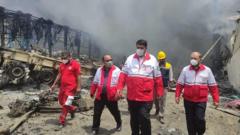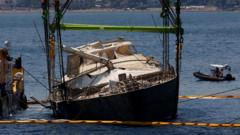A devastating explosion at Iran's largest commercial port has claimed at least 40 lives and left over 1,000 injured, intensifying criticism of government negligence in handling hazardous materials.**
Grief and Fury Erupt in Iran Following Deadly Port Explosion**

Grief and Fury Erupt in Iran Following Deadly Port Explosion**
The tragic blast at Shahid Rajaee port has sparked a wave of anger and mourning across Iran as residents search for answers.**
In Iran, a mood of deep sorrow has swiftly morphed into outrage following a catastrophic explosion at the nation's largest commercial port, Shahid Rajaee, where at least 40 people have lost their lives and more than a thousand have sustained injuries. The explosion struck on Saturday morning, igniting chaos as many rushed to hospitals to donate blood. The aftermath saw lasting fires and a thick cloud of toxic smoke engulfing the area, prompting health authorities to advise residents of nearby towns to stay indoors.
In Bandar Abbas, the southern city nearby, schools and offices were forced to close on Sunday to prioritize the emergency response efforts. A local festival intended to celebrate the community evolved into a somber memorial for the victims. As authorities declared a day of mourning on Monday, with an additional two days for Hormozgan province, frustration grew among residents regarding the government's accountability in relation to the disaster.
Intelligence from Ambrey, a maritime risk consultancy, suggests that the blaze preceding the explosion posed concerns about "improper handling" of solid fuel shipments believed to be linked to Iranian missile activities. The explosion's origin has led some to question the military’s management of potentially hazardous materials at the port, despite denials from defense officials regarding military fuel imports.
President Masoud Pezeshkian's visit to the explosion site has not quelled the public's ire. Investigations are underway to determine the specifics of the incident, with one theory being that a fire in the hazardous materials storage area might have triggered the blast. The port, critical for Iran's economy as it handles approximately 80% of imports, now faces potential disruptions, raising concerns over food shortages.
Visual documentation from the site reveals extensive destruction, with firefighters battling the ongoing fires and recovery efforts taking precedence. Global responses have continued to flow in, with condolences expressed by various nations, including Russia and the UAE. Notably, the explosion coincided with high-stakes discussions between Iranian and US officials over Tehran's nuclear ambitions, further complicating the national conversation on security and accountability in the aftermath of this devastating incident.
In Bandar Abbas, the southern city nearby, schools and offices were forced to close on Sunday to prioritize the emergency response efforts. A local festival intended to celebrate the community evolved into a somber memorial for the victims. As authorities declared a day of mourning on Monday, with an additional two days for Hormozgan province, frustration grew among residents regarding the government's accountability in relation to the disaster.
Intelligence from Ambrey, a maritime risk consultancy, suggests that the blaze preceding the explosion posed concerns about "improper handling" of solid fuel shipments believed to be linked to Iranian missile activities. The explosion's origin has led some to question the military’s management of potentially hazardous materials at the port, despite denials from defense officials regarding military fuel imports.
President Masoud Pezeshkian's visit to the explosion site has not quelled the public's ire. Investigations are underway to determine the specifics of the incident, with one theory being that a fire in the hazardous materials storage area might have triggered the blast. The port, critical for Iran's economy as it handles approximately 80% of imports, now faces potential disruptions, raising concerns over food shortages.
Visual documentation from the site reveals extensive destruction, with firefighters battling the ongoing fires and recovery efforts taking precedence. Global responses have continued to flow in, with condolences expressed by various nations, including Russia and the UAE. Notably, the explosion coincided with high-stakes discussions between Iranian and US officials over Tehran's nuclear ambitions, further complicating the national conversation on security and accountability in the aftermath of this devastating incident.




















